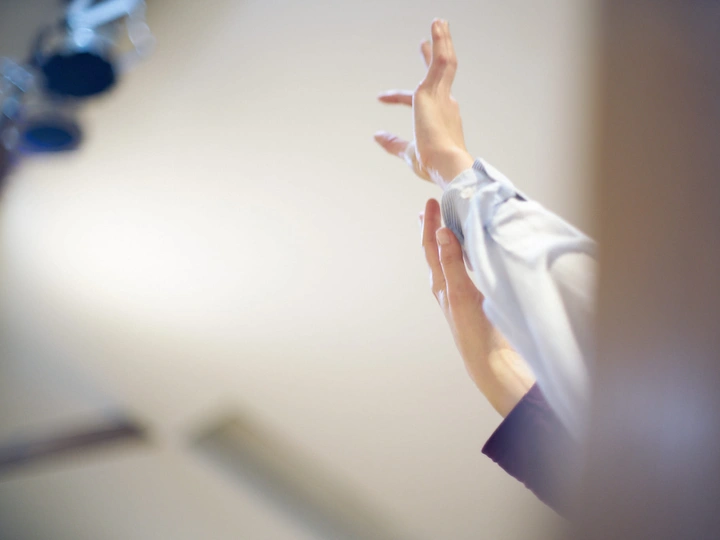SENSORY SPACE SHIFT

Wenke Schladitz
Sabrina Huth (she/her) is a dance artist, choreographer, somatic educator, and certified Myoreflex practitioner based in Berlin. She is a graduate of the MA in Artistic Research at the Amsterdam University of the Arts and a guest student of HZT Berlin. In her artistic practice, Sabrina crosses somatic practices with post-capitalist and queer fantasies of togetherness. She likes to think of herself as a host welcoming audience members and bodywork receivers into landscapes, where the real and the fictional, the poetic and the political are gently interwoven. Since 2018, with Ilana Reynolds, she has developed the choreographic approach "Imagined Choreographies" showcasing their work on stage, in galleries, and through written publications across Germany and Europe. Since 2020, with Nagao Akemi, she has explored the artistic and critical potential inherent in "resting and slowing down" regularly leading "Saturday Digestion" sessions in settings such as UdK Berlin and HZT Berlin.
Wenke Schladitz (she/her) is a spatial practitioner based in Berlin. She works in the fields of architecture, conversion, interior and exhibition design and art focusing on social aspects and the sustainable use of resources. Since 2009 she has worked as a partner with CWA architects. In their projects they look for new forms of urban living together. They create (safer) spaces for marginalized groups like people with disabilities or refugee backgrounds. For the queer housing project LOVO they received the Berlin Award 2021. In the same year Wenke was a fellow at Cité internationale des arts Paris. She has also many years of experience in improvised forms of movement/dance (Contact Improvisation, Gaga, Butoh) and somatic practices and leads workshops.
Wenke and Sabrina connected on the dance floor, sharing an interest for queer feminist and somatic practices. They believe in the pivotal role of embracing the body's transformative potential for societal and environmental change.
SENSORY SPACE SHIFT is a testing ground and discursive space for embodied explorations. By focusing on the multisensory body we will challenge the technocratic powers and exploitative methods in architecture and enable new perspectives for sustainable and inclusive practices.
The body - it’s you, it’s me, it’s us living in community. How we relate to our body is crucial for how we relate to others, the ecosystem and the planet. In late modern capitalism, reinforced by urbanization, digitalization and individualisation, we are disconnected from embodied cognition and the sense of belonging to other bodies/beings. We perceive ourselves as a mind piloting a body. Nature appears picturesque or threatening to us.
Architectural experience is a permanent interaction with the body. Shouldn’t be every architect deeply familiar with her/his/their own body as the agent of everything spatial that we can experience and create?
How to unlock the precious potential of bodily becoming to create community and belonging and regain ecological adaptability in design processes? Leaving behind the hegemonic reductive concept of the human body - as a standardized object in a Cartesian subtext - we will embrace diversity, fluidity, sensitivity and intuition:
>> AWARENESS / FROM WITHIN
exercises to reunite body and mind, reconnect to the multisensory experience and proprioception, trust your inner GPS, honor body’s intelligence, unleash your potential to sense, move and feel
>> DISCOURSE / EXCHANGE
discussing (dis)embodied architecture: patriarchal binary and visual-first strategies, discriminative patterns, knowledge production/transfer, competition and selfoptimisation, sedentary lifestyle, movement/touch crisis, accessibility
>> COCREATION / COREGULATION
an experimental setting using our bodies as building material in dialogue with site specific structures, a non-hierarchical composition of togetherness and cohabitation, a situationistic breathing intervention, a dance